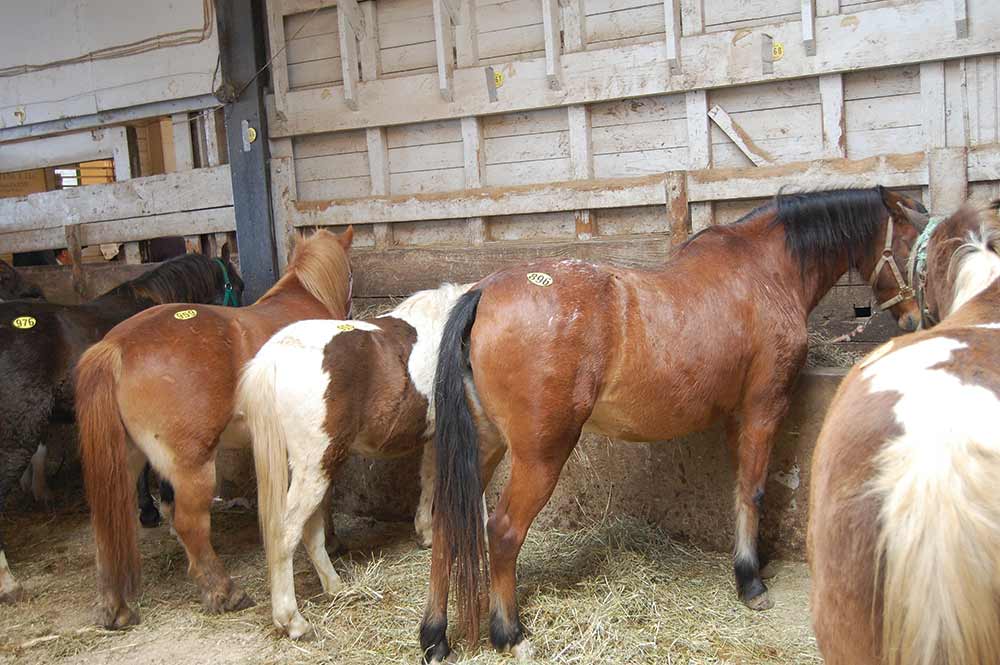
A new law in New Jersey requires horse auctions to disclose in advance any identifying information about all equines going up for sale.
Under the bill (S455), signed into law by Gov. Phil Murphy in May, auction organizers must post a horse’s identifying information to their websites, within 72 hours of being sold. The bill stipulates images of tattoos, brands and microchips be posted and records maintained for one year following the auction.
Supporters hailed the law as the best way to locate lost or stolen horses who otherwise might vanish in an auction and identify racehorses and show horses with winning records or famous pedigrees that groups would rally to rescue.
“It gives people the opportunity to find stolen horses and find homes for others,” said Darlene Supnick, owner of Forgotten Angels Equine Rescue, in Medford, NJ, who came up with the idea for the bill.
Supnick said she has noticed for years that horses who had won millions were somehow landing in the slaughter pipeline. At the same time people were discovering stolen horses only by accident when they were pulled during the auction.
She shared the story of the recent scramble to save Federale, a Thoroughbred with prominent bloodlines, shortly before he was to be loaded on the slaughter-bound truck at New Holland Sales Stables in Pennsylvania. Federale’s sire was the multimillion-dollar winning racehorse, Deputy Commander. Federale too, had a winning career, with over 50 starts and 6 wins, bringing in $94,000.
“We saved him by chance,” said Supnick. “Who knows how many others like him have ended up being slaughtered because they were not identified.”
The bill’s sponsor, Sen. Dawn Marie Addiego , who represents Atlantic, Camden and Burlington counties, said sharing the pictures of the plight of auction horses is a “commonsense solution” that will help reunite horses with owners or others who want to save them.
“Horses go to auction and you don’t know where they will end up, often slaughter,” said Addiego, an animal lover and co-founder of the Animal Adoption Center, a no-kill small animal shelter in Lindenwold, NJ. “This gives individuals a fair opportunity to reclaim their horses.”
The law will help horse rescues pull more horses out to safety, meaning less horses get subjected to kill buyers for shipment to slaughter outside of the U.S., said Brian Hackett, New Jersey state director for the Humane Society of the United States.
“While this only addresses a small part of a larger problem, it is a positive step in the right direction that will bring accountability and help save lives,” said Hackett.
Addiego, whose district includes Cranbury Sale Stable, the largest equine auction in the state, said the change will cost the state nothing and will require minimal investment by the auctions.
Marlon Garcia, Cranbury Sale Stable’s owner, said that he was not notified about the bill or the requirements of the law. He says he already posts photos and videos of the horses prior to sale, but not 72 hours before.
Recent posts on the auction’s Facebook page show images of horses with brands posted on Tuesday night ahead of the Wednesday night auction. Garcia, whose auction lists about 25 horses a week, said posting any earlier would be very difficult, as would microchip scanning all the horses that move through his sale.
“It’s going to be impossible,” he said. “How can I scan every horse that comes through?”
Auction operators who violate the law would face up to a $500 civil penalty, but it is unclear to which agency individuals would report violators and who would enforce the law.
Some in the horse rescue community fear that it could have an adverse effect, driving owners who want their horses to “disappear” to use acid on lip tattoos or use other means to obscure identification.
“I think it’s bad,” said Penny Parker, whose group, Horse Angels, rehomes horses she pulls from kill pens in Pennsylvania. “Owners will dump them and the auctions will just ship them [to slaughter]”
Similar legislation in pending in South Carolina. Animal welfare advocates in Pennsylvania, home to the New Holland sale, the largest horse auction east of the Mississippi River, and their supporters in the legislature also are considering a horse auction identification bill.




